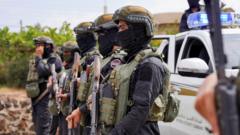In a significant development in the ongoing conflict in the Democratic Republic of Congo (DRC), the government and the M23 rebel group have officially concluded a ceasefire agreement in Qatar, known as the Declaration of Principles. This historic pact, signed on Saturday, emphasizes a mutual commitment to halt military confrontations, eschew provocative rhetoric, and refrain from occupying new territories through force. The ceasefire aims to lay the groundwork for a lasting resolution, with both parties urged to adhere to its stipulations by July 29. A comprehensive peace treaty is expected to be finalized by August 18 and is designed to align with previous arrangements facilitated by the United States between DR Congo and Rwanda, which has faced allegations of supporting the M23.
**Path to Peace: DR Congo and M23 Rebels Forge Historic Ceasefire in Qatar**

**Path to Peace: DR Congo and M23 Rebels Forge Historic Ceasefire in Qatar**
An agreement signed in Qatar signals a possible end to the long-standing conflict between DR Congo and M23 rebels.
The conflict has seen tragic consequences, including thousands of fatalities and the displacement of hundreds of thousands from their homes, augmenting a humanitarian crisis in the region. Notably, the M23 rebels have contested the death toll, stating that fewer than 1,000 have perished. DR Congo's spokesperson Patrick Muyaya highlighted that the accord incorporates the government's fundamental demand for an unconditional withdrawal of M23 from seized territories. However, M23 negotiator Benjamin Mbonimpa pointed out that the agreement does not include specific language regarding such a withdrawal, signaling potential challenges ahead.
This declaration marks the first direct agreement between the two conflicting parties since the M23 initiated its campaign earlier this year, which included capturing strategic locations like Goma and Bukavu. The African Union Commission has heralded this declaration as a pivotal milestone in the pursuit of long-term peace and security within the region, while Qatar has indicated that negotiations will persist to resolve outstanding issues.
The international landscape surrounding the conflict remains complicated, particularly after a U.S.-mediated agreement emerged last month amid criticism for perceived benefits that tie the resolution to access to DRC's extensive mineral resources. Historical perspectives highlight that the M23 was formed from a previous peace agreement that failed 16 years ago, which raises skepticism regarding the durability of the latest efforts.
In summary, while the agreement offers fresh hope for peace in the Democratic Republic of Congo, numerous hurdles remain in the path to achieving a sustainable resolution to the longstanding conflict.
This declaration marks the first direct agreement between the two conflicting parties since the M23 initiated its campaign earlier this year, which included capturing strategic locations like Goma and Bukavu. The African Union Commission has heralded this declaration as a pivotal milestone in the pursuit of long-term peace and security within the region, while Qatar has indicated that negotiations will persist to resolve outstanding issues.
The international landscape surrounding the conflict remains complicated, particularly after a U.S.-mediated agreement emerged last month amid criticism for perceived benefits that tie the resolution to access to DRC's extensive mineral resources. Historical perspectives highlight that the M23 was formed from a previous peace agreement that failed 16 years ago, which raises skepticism regarding the durability of the latest efforts.
In summary, while the agreement offers fresh hope for peace in the Democratic Republic of Congo, numerous hurdles remain in the path to achieving a sustainable resolution to the longstanding conflict.
















